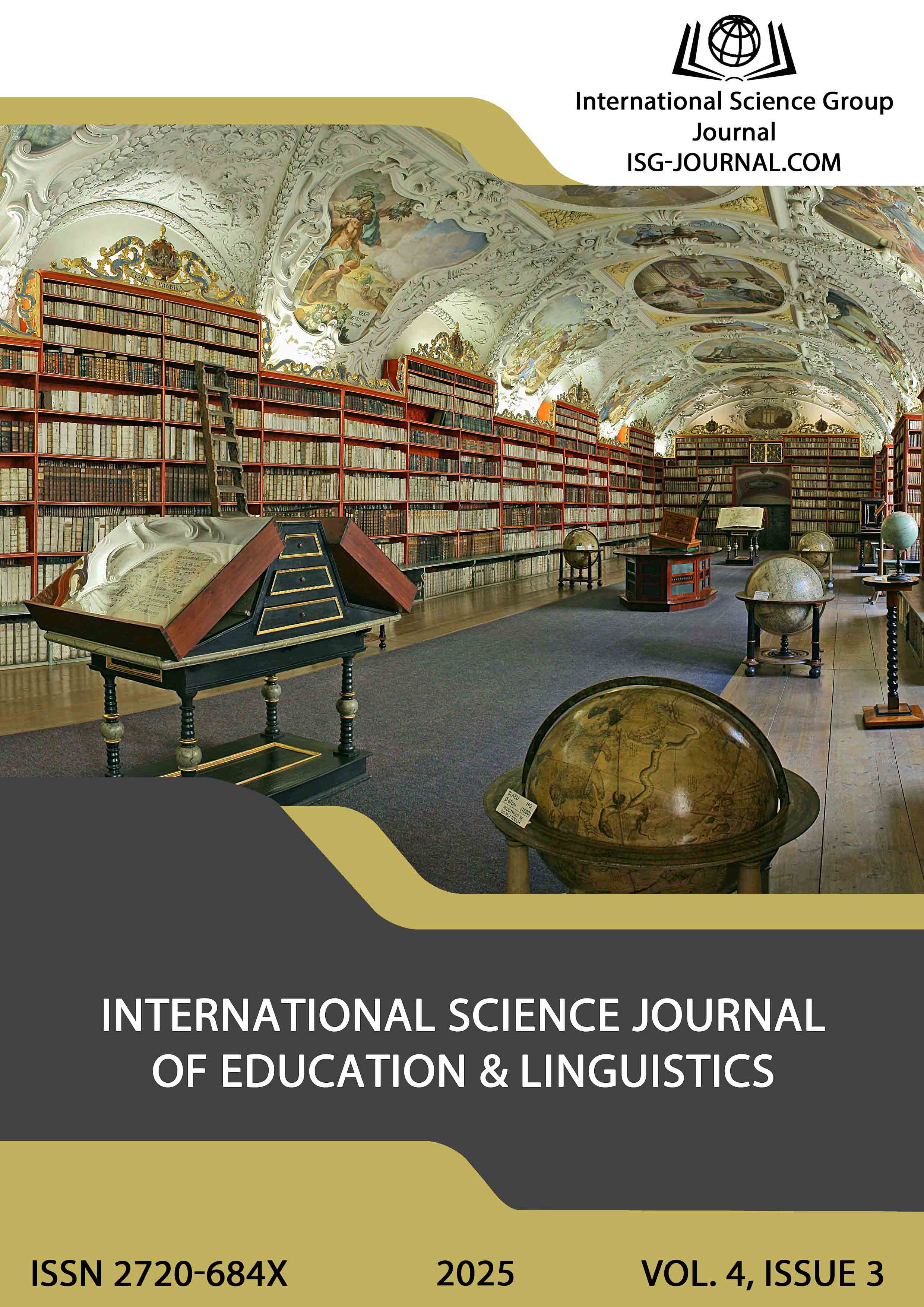Intolerance to the point of insignificance in educational training for the specialty “Anesthesiology and intensive care”
DOI:
https://doi.org/10.46299/j.isjel.20250403.01Keywords:
anesthesiology, intensive care, uncertain situation, tolerance, intolerance, students, interns, doctorsAbstract
Uncertainty is due to the incompleteness of the cognitive conscious process when a person is faced with insufficient, unclear or contradictory information. Tolerance to uncertainty is understood as psychological flexibility and openness to new experience as opposed to fatalism, determinism and other rigid systems. People with high tolerance for uncertainty are less vulnerable to stress and anxiety. Intolerance to uncertainty is defined as the dispositional inability of an individual to withstand a negative reaction caused by a certain or perceived lack of important, key or sufficient information and supported by the perception of uncertainty. All applicants for higher medical education in the specialty "Anesthesiology and Intensive Care" showed a high level of intolerance to uncertain situations. The level of tolerance to uncertain situations increases with increasing level of education depending on work experience, but never reaches a professionally dangerous level. Doctors with an extremely high level of tolerance to uncertain situations in the specialty "Anesthesiology and Intensive Care" can reasonably be considered professionally unsuitable. The latest curricula in the specialty "Anesthesiology and Intensive Care" should include recommendations for limiting the negative psychosomatic impact of intolerance for uncertainty on the subjects of study.References
Rozina, I., Malaniuk, N., Kalyniuk, A., Potapiuk, L., Tsumarieva, N. (2024). Tolerance to uncertainty as a factor in the development of higher education students’ professional identity. Sapienza: International Journal of Interdisciplinary Studies, 5 (4), 1-10. doi: https://doi.org/10.51798/ sijis.v5i4.881.
Trofimov, A., Zabolotna, V. (2023). Tolerance to uncertainty as a factor in the mental health of the population in conditions of war. Social and Legal Studies, 6, 198-209. doi: https://doi.org/10.32518/ sals3.2023.189.
Фалько Н.М., Остополець, І.Ю., Шарапова, Ю.В. (2024). Толерантність до невизначеності в контексті життєстійкості особистості. Габітус, 59, 57-60. doi: https://doi.org/10.32782/2663-5208.2024.59.8.
Курова, А.В. (2021). Ситуація невизначеності у парадигмі сучасних викликів суспільства. Науковий вісник Ужгородського національного університету. Серія «Психологія», 4, 51-55. doi: https://doi.org/10.32782/psy-visnyk/2021.4.10
Mertens, G., De Wolf, N., Bouwman, V., Engelhard, I.M. (2022). The relationship between Intolerance of Uncertainty and conditioned fear acquisition: Evidence from a large sample. The International Journal of Psychophysiology, 177, 67-75. doi: 10.1016/j.ijpsycho.2022.04.011.
Чуйко, Г.В., Чаплак, Я.В., Колтунович, Т.А. (2024). Толерантність до невизначеності у ситуації війни. Psychological Journal, 10, 1(81), 18-30. doi: https://doi.org/10.31108/1.2024.10.1.
Чуйко Г.В., Зварич І.М., Чаплак Я.В., Комісарик М.І. (2023). Теоретичні аспекти проблеми толерантності до невизначеності у психології. Міжнародний науковий журнал «Грааль науки», 30, 329-338. Код доступу: https://archer.chnu.edu.ua/xmlui/handle/123456789/7344.
Єхалов, В.В., Єгоров, С.В., Павлиш, О.С., Бараннік, С.І. (2020). Кліпове мислення в анестезіології: парадокс сьогодення. Pain, Anaeshesia & Intensive Care, 1, 39-42. doi: https://doi.org/10.25284/2519-2078.1(90).2020.193908.
Марчук, А.В. (2023). Толерантність до невизначеності студентів різних спеціальностей. Психологічні читання : збірка. матеріалів ІХ науково-практичної конференції молодих вчених. «Наука та безпека». Харків : ХНУВС, 1, 129-131. Код доступу: https://dspace.univd.edu.ua/ handle/123456789/19660.
Reis-Dennis, S., Gerrity, M. S., Geller, G. (2021). Tolerance for Uncertainty and Professional Development: a Normative Analysis. Journal of General Internal Medicine, 36(8), 2408-2413. doi: https://doi.org/10.1007/s11606-020-06538-y.
Freeston, M, Komes, J. (2023). Revisiting uncertainty as a felt sense of unsafety: The somatic error theory of intolerance of uncertainty. Journal of Behavior Therapy and Experimental Psychiatry, 79, 101827. doi: 10.1016/j.jbtep.2022.101827.
Morriss, J., Goh, K., Hirsch, C.R., Dodd, H.F. (2023). Intolerance of uncertainty heightens negative emotional states and dampens positive emotional states. Frontiers in Psychiatry, 22(14),1147970. doi: 10.3389/fpsyt.2023.1147970.
Федоришин, Г. (2022). Толерантність до невизначеності як професійна компетентність психолога. Психологія особистості, 12(1), 73-79. doi: 10.15330/ps.12.1.73-79.
Yap, A., Johanesen, P. & Walsh, C. (2023). Moderators uncertainty tolerance (UT) in healthcare: a systematic review. Advances in Health Sciences Education, 28, 1409-1440. doi: https://doi.org/10.1007/s10459-023-10215-0.
Budner, S. (1962). Intolerance of ambiguity as a personality variable. Journal of Personality, 30, 29-50. doi: https://doi.org/10.1111/j.1467-6494.1962.tb02303.x.
Саннікова, О.П., Санніков, О.І. (2020). Толерантність до невизначеності як предиктор прийняттярішень особистістю. Вісник післядипломної освіти. Серія: Соціальні та поведінкові науки, 12(41), 98–123. doi: https://doi.org/10.32405/2522‐9931/ 2522‐9958‐2020‐ 12(41)‐98‐123.
Karamushka, L.M., Tereshchenko, K. V., Kredentser, O.V., et al. (2021). Tolerance of uncertainty as a determinant of educators' psychological health in conditions of social tension. Організаційна психологія. Економічна психологія, 4 (24), 30-38. doi: https://doi.org/10.31108/2.2021.4.24.4.
Карамушка, Л. М., Креденцер, О. В., К. В. Терещенко, К. В., Лагодзінська, В. І. Івкін, В. М., Ковальчук, О. С. (2023). Методики дослідження психічного здоров’я та благополуччя персоналу організацій : психологічний практикум. Київ : Інститут психології імені Г.С. Костюка НАПН України, 76.
Becerra, R., Gainey, K., Murray, K., & Preece, D.A. (2023). Intolerance of uncertainty and anxiety: The role of beliefs about emotions. Journal of Affective Disorders, 324, 349-353. doi: 10.1016/j.jad.2022.12.064.
Седінкін, В., Клигуненко, О., Площенко, Ю. (2024). Психосоматичні ризики у суб’єктів навчання за спеціальністю «Анестезіологія». Медична освіта, 2, 120-125. doi: 10.11603/m.2414-5998.2024.2.14568
Кравець, О., Площенко, Ю., Єхалов, В., Минка, Н. (2025). Психосоматичні розбіжності в здобувачів освіти анестезіологічного профілю різного рівня. International Science Journal of Education & Linguistics, 4(2), 2025, 91-101. doi:10.46299/j.isjel.20250402.08.
Sagone, E., Indiana, M. L. (2022). Role of Decision-Making Styles and Intolerance of Uncertainty on Procrastination During the Pandemic. Journal of Higher Education Theory and Practice, 22(17), 14-27. doi: https://doi.org/10.33423/jhetp.v22i17.5655.
Cockburn, J., Man, V., Cunningham, W.A., O'Doherty, J.P. (2022). Novelty and uncertainty regulate the balance between exploration and exploitation through distinct mechanisms in the human brain. Neuron, 110(16), 2691-2702.e8. doi: 10.1016/j.neuron.2022.05.025.
Stephens, G.C., Rees, C.E., Lazarus, M.D. (2021). Exploring the impact of education on preclinical medical students' tolerance of uncertainty: A qualitative longitudinal study. Advances in Health Sciences Education, 26(1), 53-77. doi: https://doi.org/10.1007/s10459-020-09971-0.
Downloads
Published
How to Cite
Issue
Section
License
Copyright (c) 2025 Olga Kravets, Dmitro Stanin, Vasil Ekhalov, Vladislav Sedinkin, Daria Krishtafor

This work is licensed under a Creative Commons Attribution 4.0 International License.





